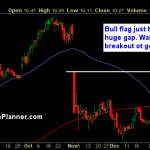In a decision that many had anticipated, the SEC Thursday night officially rejected a proposal from a Chinese investment group to purchase the Chicago Stock Exchange – which handles a tiny 1% of daily order volume – in an acquisition that would have created a conduit for a Chinese entity to exert more control over IPOs of China-based companies in the US, where markets are significantly more open to international investors than in China. Hundreds of small companies are waiting to list in China, where they’re being held up by red tape.
The CSE buyers group included Chongqing Casin Enterprise Group Co. and a consortium of US based investors after two original Chinese members of the investor group dropped out late last year after the deal appeared to stall.
As Bloomberg explains, the small transaction would nevertheless have allowed a Chinese company to gain an important foothold in US financial markets, even as the Congress in recent years has passed laws trying to make it easier for companies to go public. The exchange planned to leverage the Jumpstart Our Business Startups, i.e. JOBS, Act, a 2012 law Congress passed to make it easier for smaller companies to go public.

It was reported late last year that the White House was exerting pressure to block the deal. SEC staff had reportedly wanted to approve the deal, but the new chairman, Jay Clayton, froze the agency’s pending decision to approve back in August – a rare move for a new commissioner.
The deal, a Chinese takeover of an institution in the American financial markets, has drawn fierce political opposition as Trump pushes back against unfair trade practices with several measures indirectly and directly aimed at China.
Though the transaction was relatively small, it drew outsize attention because of the country of origin of the lead investor, Chongqing Casin Enterprise Group Co. SEC Chairman Jay Clayton, who joined the agency this year following a career as a deals lawyer, has publicly fretted that it’s too hard for companies to go public in the US. The exchange had hoped to address that situation by selling itself, while also creating a conduit to China.
But opponents of the takeover, including a number of U.S. lawmakers, said letting a Chinese firm invest in a U.S. exchange was a bad idea. On the campaign trail, Donald Trump blasted the transaction after it was announced in early 2016. A year ago, the sale was cleared by a panel that reviews foreign takeovers for national security threats.












Leave A Comment